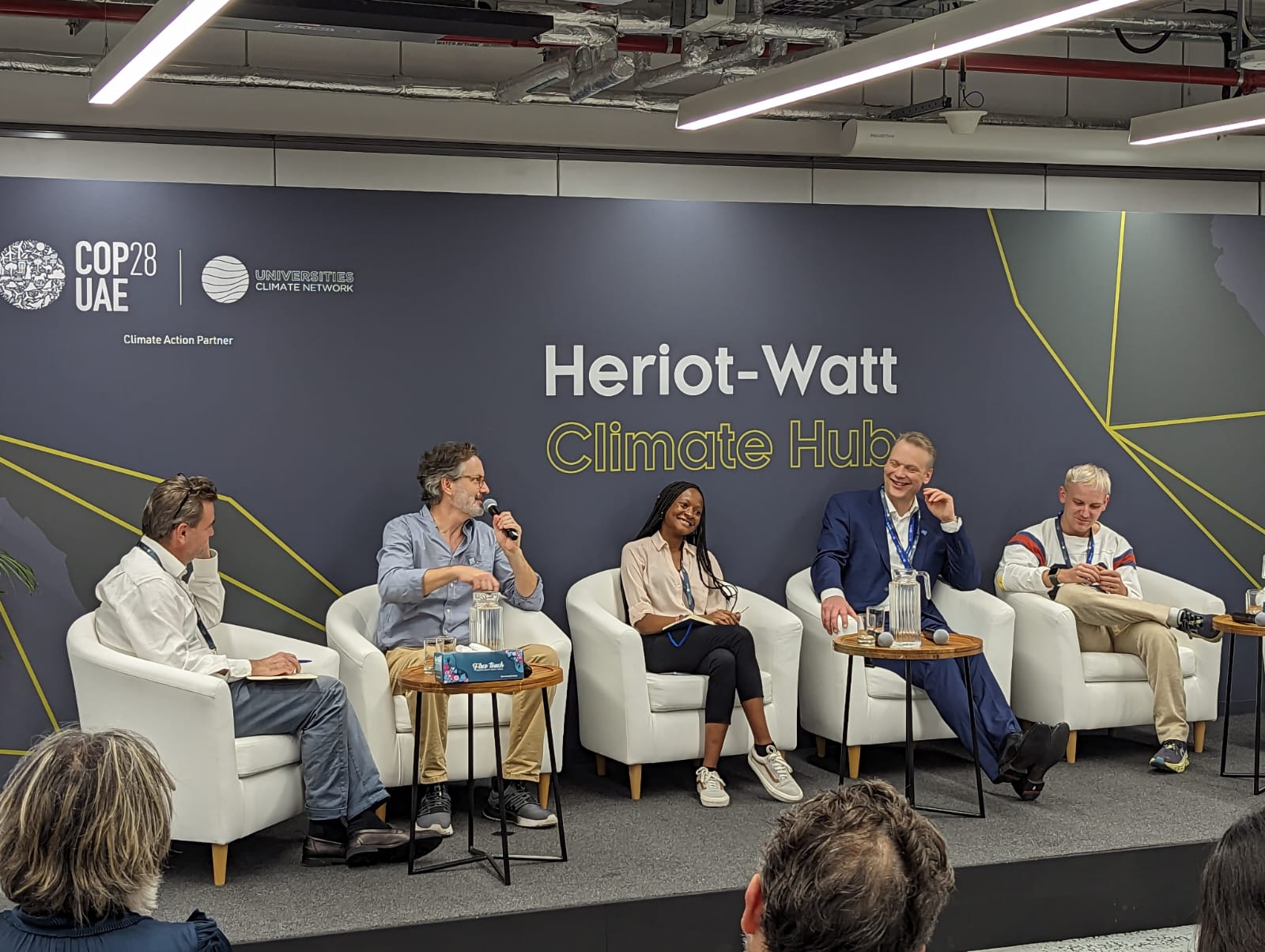Partnerships for Nature: insights from Indigenous-led models in Canada
15 April 2025 / WORDS BY Pollination Foundation
read article
London+44 203 355 1556
Sydney+61 2 8313 7109
Melbourne +61 2 8313 7109
Washington +1 872 201 1168
In this second edition of Nature Finance Focus, we highlight a number of models that are helping to unlock and scale nature investment. Some models are well established, alongside others in which we see significant promise and growth. By showcasing these tangible case studies, we aim to provide ideas and options which can be taken up by the global bank or investor, or by the major corporate.
The report also details the findings of our biennial survey of 500 institutional investors across the UK, USA, Australia, Singapore and Japan.
View reportFour years ago, when Climate Asset Management launched as a joint venture between HSBC and recently formed consultancy Pollination, it laid out ambitious plans to become the biggest investor dedicated to natural capital.
15 December 2023 / WORDS BY Pollination
Leading up to COP28, there was significant momentum and high aspirations for meaningful progress on addressing the climate crisis. The UAE presidency positioned the conference as “a transformational COP of action,” and countries and observers alike expected increased ambition following the sobering results of the first Global Stocktake earlier this year. A record number of participants convened in Dubai from 30 November through 12 December, with in-person and virtual attendance totaling more than 100,000. Representation included climate changemakers across the public, private, and philanthropic sectors, with 10 Pollination leaders on the ground actively engaging in key conversations.
In a strong start, COP28 saw over US$83 billion mobilised for climate action in the first week. Particularly exciting was the follow-through on the COP27 mandate to operationalise the Loss and Damage Fund, with country pledges totaling US$726 million in the initial seven days alone.
However, this momentum was substantially dampened when the COP28 presidency became mired in defending its dedication to the 1.5°C goal of the Paris Agreement amid allegations that it denies a core part of climate science and accusations that it would be using COP to advance fossil fuel deals. At the same time, many of the negotiations resulted in significant stalemates with little progress on key decisions. As the conference drew to a close, countries had not yet agreed on many of the notable points of contention, with the final COP28 guidance failing to reflect the level of ambition for which many had hoped. Issues that were expected to be resolved in 2023 are now being postponed until COP29, including winding down the Clean Development Mechanism (CDM) and issuing guidance on the Article 6.4 process for trading emission reduction units.
Following COP28, there are a number of key takeaways that will be relevant for governments, corporates, and other organisations seeking to adopt responsive strategies.
Here’s our round-up of the top things you need to know.

1 | The Global Stocktake guidance called for a transition away from fossil fuels.
Every five years, the Global Stocktake (GST) affords an opportunity to assess mitigation and adaptation progress and to understand whether we are on track to limit the global temperature rise to 1.5°C, with outcomes informing countries’ nationally determined contributions (NDCs). The first GST report, released earlier this year, found that the world is not on pace to meet the targets outlined in the Paris Agreement. COP28 presented a chance for the presidency to publish further stocktake guidance around how countries can amplify their efforts to better progress toward climate goals, and many had hoped the GST guidance released at COP would reflect strong language related to the need for increased ambition. However, the final output left much to be desired on key issues such as adaptation, resilience, and nature.
One of the critical points in the GST discussions was the inclusion of language related to a “phase out” or “phase down” of fossil fuel usage as a recommendation for countries to stay on track to achieve the 1.5°C goal. We saw emotionally charged debates on this topic, with three main positions arising: many of the least developed countries and small island developing states were adamant that language calling for a phase out was essential; large developed countries (including the US, EU, and Australia) were willing to accept a call for the phase out of unabated fossil fuels; and more than a dozen large developing countries (including Saudi Arabia, India, and China) resisted any language relating to a fossil fuel phase out or phase down.
The final decision calls on countries to contribute to “transitioning away from fossil fuels in energy systems, in a just, orderly and equitable manner, accelerating action in this critical decade,” only explicitly referencing a phase down of unabated coal power. It also caveats this language by noting that “transitional fuels can play a role in facilitating the energy transition while ensuring energy security.” This compromise left many negotiators and civil society actors disappointed.
Nevertheless, reaching consensus on this language marks an important entry of the term “fossil fuels” into the global record, sending a market signal that the global community is taking the energy transition seriously. The text also contains important expectations for the decarbonisation speed necessary to contain global heating to Paris-aligned levels.
The final language further re-enforces ongoing initiatives, including those related to the managed phase out of fossil fuel power through the work of bodies like the Just Energy Transition Partnerships (JETPs) and the Energy Transition Accelerator (ETA). It offers a backstop for new global initiatives, such as the pledge made by 118 governments to triple the world’s renewable energy capacity by 2030 and the Oil & Gas Decarbonization Charter in which 50 companies representing 40% of global production have agreed to reach near-zero methane emissions by 2030. Domestic policies, such as the Inflation Reduction Act (IRA) in the United States, will also have additional support under the newly released guidance. Additionally, for the first time, the interdependence of biodiversity and climate was recognised in the GST, specifically highlighting the importance of protecting and conserving ecosystems.
In light of the UAE consensus, governments may have increased political cover to enact stricter emission reduction and nature requirements, which may in turn impact companies’ operations and necessitate adjustments to business practices. Financial institutions and philanthropies will need to identify ways to support this transition through accelerating the deployment of capital and resources. Organisations that anticipate and adapt to these changes quickly can position themselves for long-term success and make meaningful progress toward addressing the climate crisis.
2 | A variety of stakeholders drove action around carbon markets, despite a lack of official guidance on Article 6.
Pollination believes that market-based approaches are critical tools for achieving decarbonisation and keeping the 1.5°C goal alive. COP28 failed to deliver any progress on guidance for international market-based approaches under Article 6 of the Paris Agreement, resulting in a lack of clarity that may hinder the operationalisation of such approaches. Due to the inability to reach a consensus on several key elements, countries ultimately rejected decision texts under Article 6.2 and Article 6.4, which may lead to delays in catalysing climate finance via these mechanisms. Despite these regrettable results, outside the negotiations, countries continued to move forward with deals under Article 6.2, led by Switzerland—which announced agreements with Chile, Kenya, and Tunisia—and Singapore—which reached agreements with Papua New Guinea, Fiji, Senegal, and Costa Rica. Singapore also came to another joint agreement with Rwanda and Kuwait.
Additionally, there was momentum around regional and domestic carbon market frameworks. For example, Türkiye announced it will launch the first phase of its emissions trading scheme in 2025, Vietnam previewed its domestic compliance market to be piloted in 2025 and operationalised in 2028, and Rwanda launched its national carbon market framework. Further, there were significant voluntary carbon market announcements at COP28, including landmark transactions by the LEAF Coalition, which could result in over US$60 million in carbon finance to Ghana and Costa Rica from multiple corporate buyers and the public sector. A number of voluntary carbon market reform efforts were launched, such as a partnership between six independent carbon crediting programmes to promote scale and integrity in carbon markets and the collaboration between three international organisations to establish a comprehensive integrity framework for the use of carbon credits. On the research front, Pollination launched a new report in partnership with the Voluntary Carbon Markets Integrity Initiative (VCMI) with rich insight on the role of philanthropies in driving carbon market readiness.
These evolutions demonstrate continued momentum for carbon finance via market-based approaches—transactions will continue under Article 6.2 and in the voluntary carbon market despite slow progress to establish other international frameworks. Subsequent advancement will require collaboration between the wide network of stakeholders involved in the carbon market space to identify and address gaps, ensure consistency and integrity, and scale the implementation of market-based solutions to drive more systemic change.
3 | Agriculture and land use considerations arose as key levers in addressing climate change.
The transformation of food systems and the rise of regenerative agricultural are now firmly on the agenda, with multiple actors from governments, corporates, philanthropic organisations, and financial institutions working toward the same transformative ambition. However, a stark financing gap to scale at the speed needed still remains: it is estimated that between US$300 and $400 billion of capital is needed per year to finance a sustainable food system, with only a fraction of that amount currently flowing.
Bridging this gap will require collaboration between all stakeholders. Public-private-community partnerships can catalyse the flow of finance to scale regenerative systems from the ground up, while philanthropies can work together to de-risk private sector capital and provide the necessary capacity-building at the landscape level, especially in developing economies. For example, the RAFT Coalition of 25 philanthropies joining funds to implement regenerative solutions has the potential to be groundbreaking if the capital is deployed strategically.
In the year ahead, companies that embrace regenerative practices can enhance their resilience in an ever-changing supply chain landscape with an increasing focus on environmental responsibility. At the same time, financial institutions can mobilise capital to fund agricultural reform in those areas that are most in need or best equipped to make meaningful progress.
4 | Indigenous peoples and local communities helped shape the conversation to drive meaningful progress.
Sustaining 80% of the world’s remaining forest biodiversity and holding lands that store over 55 million metric tonnes of carbon annually, Indigenous peoples and local communities (IP&LCs) play a critical role in the net-zero transition and must have a seat at the table. At COP28, there was a call-to-action for direct finance to secure land and tenure rights for IP&LCs and to accelerate community-based nature and climate solutions. As with COP15, the discourse around IP&LCs at COP28 moved beyond benefit-sharing and focused instead on opportunities for IP&LC decision-making and leadership. IP&LCs asked for greater trust, while donors identified several opportunities that can be addressed to build greater momentum, such as increasing investment into IP&LC-led regranting platforms and providing core operational support to IP&LC organisations. Concerns were raised around Indigenous peoples’ rights amidst increasing demand for minerals mined for renewable energy storage, electrified transportation batteries, and other green energy technologies. Potential solutions proposed included co-owned climate, nature, and resource joint venture projects.
IP&LC leadership is now recognised as central to achieving the Paris Agreement goals, and we expect to see greater transparency in the future, including tracking best practice models of partnership and investment into IP&LC land and tenure rights and community-based solutions. In the year ahead, it will be critical to ensure Indigenous and local voices are well represented and that groups are equipped with the necessary support to continue protecting the natural resources essential for the health of the planet.
5 | Nature and climate goals were inextricably linked, with a commitment to tackling both using an intersectional approach.
The message about pursuing climate, nature, and just transition goals in tandem has finally landed. This was illustrated by the UAE COP28 and China COP15 presidencies releasing the first-ever Joint Statement on Climate, Nature and People—a landmark acknowledgement of the interlinked objectives of the Paris Agreement and the Global Biodiversity Framework (GBF).
Further initiatives and announcements demonstrated widespread recognition of nature as our greatest ally in the fight against climate change, such as the UK and French government-led International Advisory Panel for Biodiversity Credits (IAPB)’s work to scale up high-integrity nature-based credit markets and encourage enabling policy and regulatory mechanisms to generate significant investments in nature. Encouragingly, the IAPB is comprised of diverse and experienced individuals across finance, industry, NGOs, and IP&LCs—a crucial consideration to ensure these initiatives are inclusive and equitable from the onset. Biodiversity credit markets have the potential to help bridge the nature financing gap and provide measurable benefits, representing a potentially critical financing tool to conserve and restore nature.
However, there is still much progress to be made. To sustainably manage biodiversity and protect ecosystem integrity, it is estimated that US$1 trillion will need to be invested annually by 2030, a stark difference from the current investment of US$166 billion per year. The UNEP’s State of Finance for Nature report showed that capital for activities directly harming nature was over 30 times the amount of capital currently being directed toward nature-based solutions annually, highlighting once again why reducing the degradation of nature and advancing subsidies that deliver those outcomes at pace must be a priority.
At COP28, Pollination announced that it will be an advisor on GAIA, a new US$1.48 billion debt fund that sits at the intersection of climate and nature and focuses on sectors such as water, food security, climate resilience, and agriculture. This initiative represents a key opportunity to work toward closing the nature financing gap.
We are already seeing significant activity from a wide range of stakeholders to update operating models and mobilise finance toward more nature-positive aligned activities, a trend that is only expected to increase in the year ahead. Through heightened investment in this space, organisations can accelerate the transition and capitalise on the immense level of financial and impact-related opportunity.
—
Ultimately, while the negotiations at COP28 may have fallen short of expectations for increasing ambition, the event did catalyse meaningful unilateral and bilateral country action, along with commitments from multilateral development banks, development finance institutions, corporations, and researchers. Pollination is encouraged by the level of private sector engagement in the COP28 discussions and by the scale of the commitments that have sprung from these conversations.
To accelerate meaningful progress on climate and nature, it will be necessary for corporates, governments, financial institutions, NGOs, and philanthropies to drive change at both an organisational and systematic level. Pollination offers deep expertise across the regulatory, financial, environmental, business, and legal landscapes to help our clients shape and implement climate and nature strategies that move the needle. To learn how your organisation can navigate the new directives coming out of COP28, contact us at contact@pollinationgroup.com.













15 April 2025 / WORDS BY Pollination Foundation
read article
Receive latest news and global perspectives from Pollination.
By clicking submit, you agree to our Terms & Conditions.